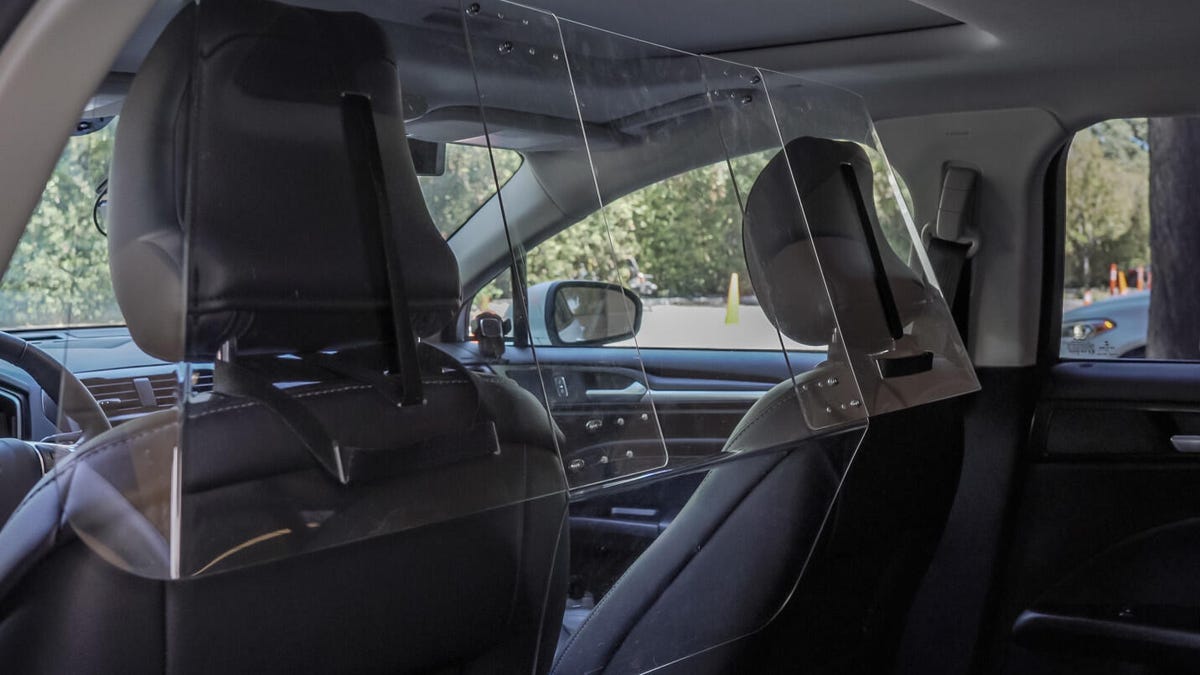Lyft offers some drivers free partitions for their cars, others have to pay $50
The ride-hailing company's goal is for 60,000 of its most active drivers to put barriers between the front and back seats to slow the spread of COVID-19.

Lyft will be selling these vehicle partitions to drivers later this summer.
Lyft announced Friday that it's going to provide thousands of plastic partitions to drivers to put between the front and back seats. The company said the idea is to better protect drivers from the spread of the novel coronavirus. Frequent drivers in select cities will get the partitions for free, while other drivers will have to buy the barriers through Lyft's online shop.
"By prioritizing the wellbeing of our drivers, our entire community gains extra peace of mind," Angie Westbrock, Lyft's vice president of global operations, said in a blog post.
Ride-hail drivers have experienced a rough time during the pandemic. Many have seen their earnings decimated as shelter-in-place orders have reverberated around the country. Other drivers have gotten sick with COVID-19, the disease caused by the coronavirus, or had difficulties getting the necessary protective gear and support from Uber and Lyft. At least six drivers are known to have died from the disease.
The US Centers for Disease Control and Prevention recommends that people avoid sitting in confined spaces with strangers, such as a car, to lower the risk of coronavirus infection. The agency also says putting a partition between the front and back seats could help maintain the distance between drivers and passengers.
Lyft had been advising drivers to buy plastic partitions through Amazon, which it partnered with at the end of March. But, earlier this month, the company began giving the barriers to select "highly active" drivers in Atlanta, Denver and Baltimore. It's now expanded that program to Washington, D.C., Los Angeles, Seattle, Boston, Phoenix, Dallas and New York City.
Lyft said its goal is to have 50% of rides in these cities be in cars with partitions. It plans to expand the program to a total of 30 regions across the country in "coming months." At that point, the company said 60,000 drivers will have received the free barriers.
But all of Lyft's more than 1 million other drivers will be on their own. For them, Lyft said "later this summer" it will make the partitions available for purchase in its Lyft Store. Along with partitions, drivers can buy cleaning supplies and face masks at the online store. Lyft emphasized that it's not making a profit on the supplies, but rather providing them to drivers at cost. It did say the third party that facilitates the Lyft Store will add a small markup.
"Lyft charging drivers for basic safety equipment during a global pandemic is obviously shameful, but not surprising," Jerome Gage, Lyft driver and leader with the driver group Mobile Workers Alliance, said in an email. "It combines the two things that gig companies love doing most -- treating drivers as disposable and forcing drivers to absorb all the costs of doing business while they reap the profits."
Lyft said it expects the partitions to cost drivers around $50. It'll sell reusable cloth face masks for $1.92 and packs of 50 disposable face masks for $26.50. A 10-ounce pump of hand sanitizer gel will cost $4.92 and a 32-ounce canister of disinfectant will be $6.59.
The company had been handing out free masks and cleaning supplies at certain driver centers in specific cities. But drivers said those supplies tended to run out or the centers were too far away to access. Lyft said it'll continue that program but supply levels will vary depending on the location. The company added that it's now starting to send its "most active drivers" a free safety kit, which has a cloth face mask, sanitizer and disinfectant.
Lyft joined Uber in May in requiring all drivers and passengers to wear masks while on rides. Both companies are also giving in-app recommendations, like keeping windows rolled down during trips, and making riders and drivers confirm they are symptom-free before each ride.

